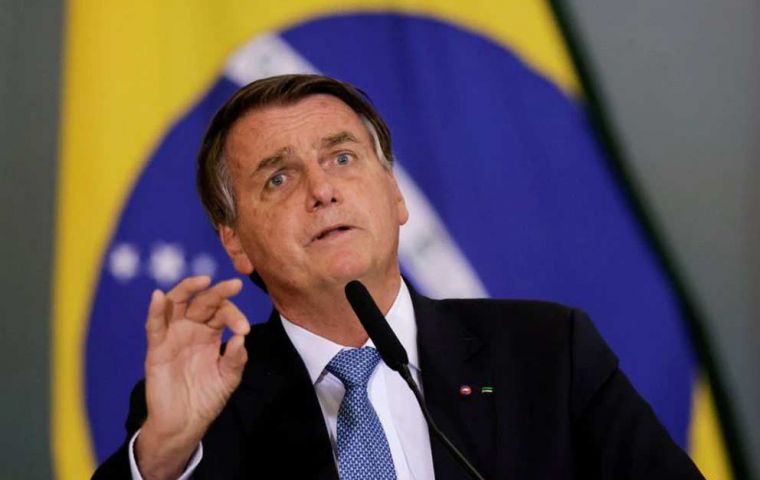MercoPress. South Atlantic News Agency
Fuel goes up in Brazil amid international surge in crude oil
 Bolsonaro said in those circumstances an increase in the price of fuel could not be helped
Bolsonaro said in those circumstances an increase in the price of fuel could not be helped Brazil's oil company Petrobras Monday decreed an increase in the price of gasoline of 7.04% at refineries and 9.15% in the case of diesel fuel, it was announced. These adjustments were to impact the price consumers pay at pumps as of Tuesday.
President Jair Bolsonaro had already warned Sunday this was coming. During an event in Brasília, he stated that “unfortunately, due to the figures of oil prices abroad and the dollar here in the next few days, starting tomorrow, unfortunately we will have a fuel price increase.”
Thus, the average selling price of gasoline will go from R$ 2.98 (US $ 0.53) to R$ 3.19 (US $ 0.57) per liter, an average 7.04% increase per liter. It is the second increase this month after a 7.2% rise Oct. 9.
Meanwhile, the liter of diesel A will go from R$ 3.06 (US $ 0.55) to R$ 3.34 (US $ 0.6), an average readjustment of 9.15%. The last increase had been 8.89% Sept. 28, .
So far in 2021, diesel accumulates an increase of 65.3% at refineries, while gasoline rose 73.4%.
At pumps, the average price of gasoline was R$ 6.36 (US $ 1.14) a liter last week, with the maximum value reaching R$ 7.46 (US $ 1.34), according to the National Agency for Petroleum, Natural Gas and Biofuels (ANP), while diesel oil, in turn, registered an average price of R$ 5.04 (US $ 0.91) and a maximum price of R$ 6.42 (US $ 1.16) per liter.
“These adjustments are important to ensure that the market continues to be supplied on an economic basis and without the risk of shortages by the different actors responsible for serving the various Brazilian regions: distributors, importers and other producers, in addition to Petrobras”, said the company in a statement.
The US dollar exchange rate and the international price of oil have been decisive on the domestic price of fuel since 2016, when Brazil started using the International Parity Price (PPI) as a reference.
The dollar reached R$ 5.6282, accumulating an increase of more than 3% in the week.
The intrenational price of oil went up Monday to levels similar to those recorded in October 2018, as the price of a barrel of Brent crude reached US $ 86.43 due to shrinking supply, it was reported.
The new price came after Saudi Arabia urged OPEC + members to handle global crude supplies with caution due to the spread of the COVID-19 pandemic, while demand from consumers stayed stable. After more than a year of depressed fuel demand, gasoline and distillate consumption is back in line with five-year averages in the United States, the world’s largest fuel consumer.
Brent crude futures gained US $ 1.01, or 1.2%, to $86.54 a barrel. In this scenario, West Texas Intermediate (WTI) crude also saw a considerable increase in its price, which reached US $ 84.76 at the beginning of the day, the highest figure since 2014.
Both benchmarks have climbed by around 20% since the start of September. US crude has risen for nine straight weeks, while Brent has risen for seven. Prices have also been bolstered by worries over coal and gas shortages in China, India and Europe, which spurred fuel switching to diesel and fuel oil. In India, refiners’ crude oil refineries boosted output to meet surging demand, it was reported Friday.
Analyst have forecast that due to the strong rebound in global oil demand, the price of a barrel of Brent crude could cross the psychological US $ 90 threshold before the end of 2021, as demand is now projected to return to pre-mandemic levels shortly, in a addition to the ongoing gas-to-oil switching which could pump may oil demand worldwide by at least 1 million bpd.
The Organization of the Petroleum Exporting Countries, Russia and their allies, known as OPEC+, earlier this month said it would continue an existing deal under which it agreed to boost output by 400,000 bpd a month until at least April 2022.
Last week, the price of a barrel of Brent oil – an international benchmark – closed up at US $ 85.53, close to the highs since the end of 2018. At the beginning of the year, the average price was below US $ 65.




Top Comments
Disclaimer & comment rulesCommenting for this story is now closed.
If you have a Facebook account, become a fan and comment on our Facebook Page!